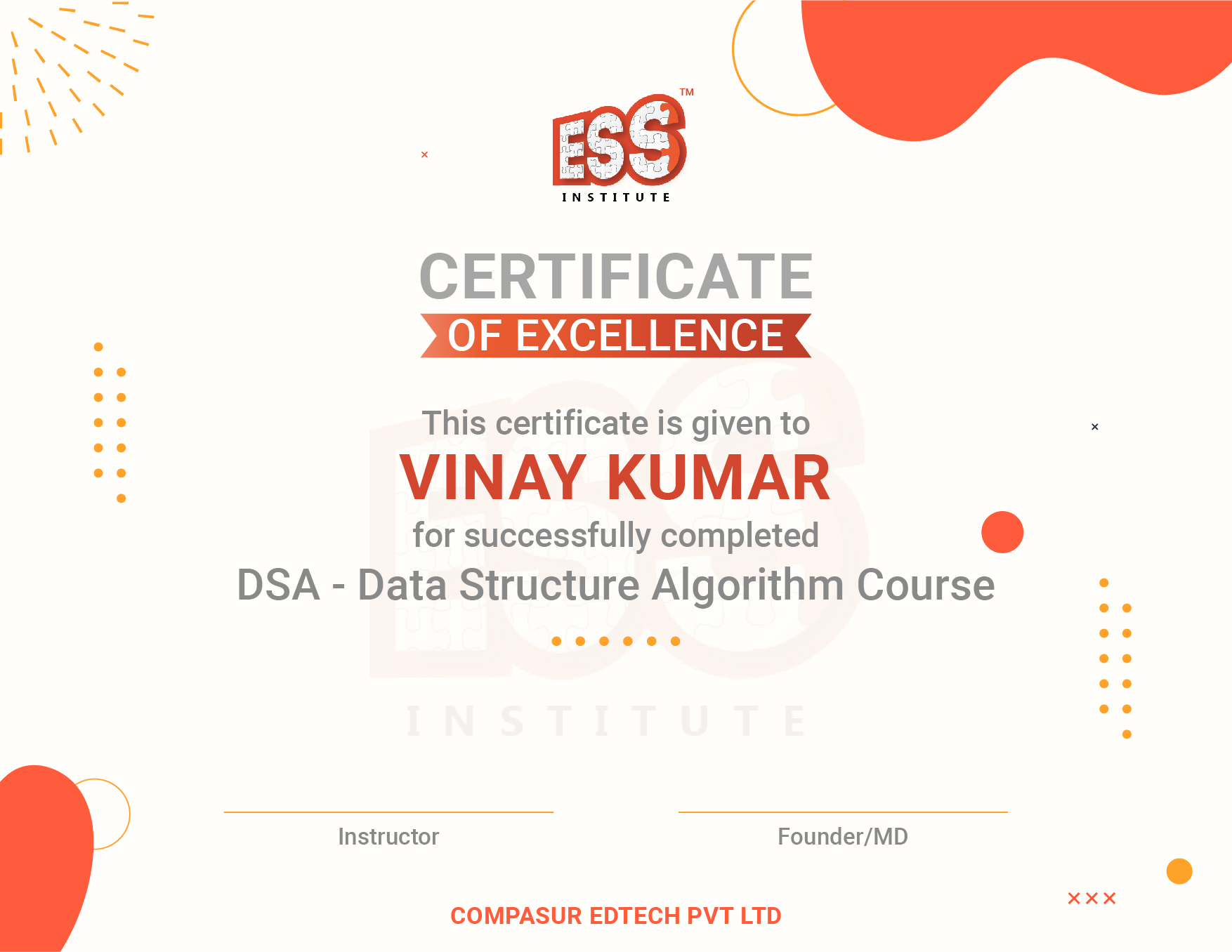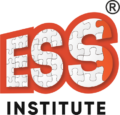Data Structure Course Institute In Dwarka
Best Data Structure Algorithm Course Near you
Many things you would get to know under this course from us like : What is DSA? How does it work or mean and be effective for today’s dynamic environment? What are different Job Opportunities in this? How everything functions internally and how they are hosted. We’ll pay close attention and comprehend everything!
Book You Demo Class
3-Months Course Duration
500+ Learners Trained
Guaranteed Placement
Guaranteed Certification
Course Curriculum
- Introduction to Data Structures and Algorithms
1. What are Data Structures?
2. What are Algorithms?
3. Importance of DSA in Problem Solving
4. Time and Space Complexity
5. Big O Notation
6. Big Omega and Big Theta Notations
7. Asymptotic Analysis
- Arrays
1. Introduction to Arrays
2. Operations on Arrays
3. Insertion, Deletion, and Traversal
4. Two-Pointer Technique
5. Sliding Window Technique
6. Hashing Basics
7. 1D and 2D Arrays
8. Common Problems and Solutions
9. Interview Questions on Arrays
- Linked Lists
1. Introduction to Linked Lists
2. Singly Linked List
3. Insertion, Deletion, and Traversal
4. Doubly Linked List
5. Circular Linked List
6. Operations on Linked Lists
7. Common Problems and Solutions
8. Interview Questions on Linked Lists
- Stacks
1. Introduction to Stacks
2. Stack Operations
3. Push, Pop, Peek
4. Stack Implementation
5. Applications of Stack
6. Expression Evaluation (Infix, Prefix, Postfix)
7. Balanced Parentheses
8. Common Problems and Solutions
9. Interview Questions on Stacks
- Queues
1. Introduction to Queues
2. Queue Operations
3. Enqueue, Dequeue, Peek
4. Types of Queues
5. Circular Queue
6. Priority Queue
7. Deque (Double-Ended Queue)
8. Queue Implementation
9. Applications of Queue
10. Common Problems and Solutions
11. Interview Questions on Queues
- Heaps
1. Introduction to Heaps
2. Binary Heap
3. Min Heap and Max Heap
4. Heap Operations
5. Insertion, Deletion, Heapify
6. Priority Queue Implementation Using Heaps
7. Heap Sort
8. Common Problems and Solutions
10. Interview Questions on Heaps
- Graphs
1. Introduction to Graphs
2. Graph Representation
3. Adjacency Matrix
4. Adjacency List
5. Graph Traversal Techniques
6. Breadth-First Search (BFS)
7. Depth-First Search (DFS)
8. Minimum Spanning Tree
9. Kruskal’s Algorithm
10. Prim’s Algorithm
11. Shortest Path Algorithms
12. Dijkstra’s Algorithm
13. Bellman-Ford Algorithm
14. Common Problems and Solutions
15. Interview Questions on Graphs
16. Searching & Sorting Algorithms
17. Linear Search
18. Binary Search
19. Sorting Algorithms
20. Bubble Sort
21. Selection Sort
22. Insertion Sort
23. Merge Sort
24. Quick Sort
25. Heap Sort
26. Time Complexity Analysis
27. Common Problems and Solutions
28. Interview Questions on Searching & Sorting
- Array
- String Problems
- Bit Manipulation Techniques
- What is Dynamic Programming
- Memoization and Tabulation
- DP Problems
- Sliding Window Problem
- Sorting & Searching
- Binary Search
- Singly
- Doubly
- Circular
- What is a Stack?
- Stack Operations
- What is Queue?
- Circular Queue
- Binary Tree
- BST ( Binary Search Tree )
- AVL Tree
- Priority Queue
- What is Hashing?
- Need of Hashing
- Hashing Problems
- Tries & Pattern Matching Problems
- Graph Algorithms
- Graph Traversals – BFS & DFS

This course aims to give you the complete knowledge and practical skills of different key areas of computer science and programming, regardless of your level of experience. Whether you’re a beginner looking to build a strong foundation or an experienced programmer aiming to enhance your problem-solving and algorithmic skills, a data structures and algorithms course can provide you with valuable knowledge and skills applicable to various domains of computer science and software development.
Don’t miss this opportunity to become a proficient Data Structure and Algorithm developer. Enroll now and step on a journey towards creating powerful, dynamic web applications. You will get practical exercises and projects that let you put your knowledge to use. You will also have the opportunity to interact with our experienced instructor throughout.
Tools and Technologies covered

MongoDB

Express JS

React JS

Node JS
Get Certified and Grow your career
You will receive a certificate from ESS Institute for completing the Data structure course that will help you find the most relevant jobs like…
- Computer Science and Software Development
- Artificial Intelligence and Machine Learning Professionals
- Startups and Entrepreneurs
- Academic Researchers
- Cybersecurity Experts

This course will teach you the following skills
- By completing this course, you will develop or establish a solid foundation in the computer science field, which is important for further studies and career advancement.
- You will be learning how to design and analyse different algorithms. This includes understanding time and space complexity and Big O notation.
- You will gain insights into how data structures and algorithms are applied in real word scenarios.
- It would be helpful in opening doors to job opportunities for you in the tech industry.
Job Opportunities
- Computer Science and Software Development
- Artificial Intelligence and Machine Learning Professionals
- Startups and Entrepreneurs
- Academic Researchers
- Cybersecurity Experts
- Gaming and Graphics Developers
- Database Administrator and Big Data Engineers
- Healthcare Data Analysts
Course for
- Computer Science Students
- Programming Enthusiasts
- IT Professionals
- Artificial Intelligence and Machine Learning Practitioners
- Academic and Career Switchers
Minimum Eligibility
The specific requirements for a data structures and algorithms course can vary depending on the course level, and the intended audience. However, here are some common prerequisites and requirements you might encounter: Programming Knowledge, Mathematics Background, Computer Science Foundation, etc.
Enroll Now DSA Course

Frequently Asked Questions
Look at the most common frequently asked questions of students in 2023-24
Making a data structures and algorithms course offers several compelling reasons, making it a valuable investment in your education and career. Taking a data structures and algorithms course is a vital choice for someone interested in computer science, programming, or technology. It provides you with essential knowledge and skills, that will enhance your problem-solving abilities, and opens up a wide range of academic and career opportunities in the tech industry.
Completing a data structures and algorithms course can open up a wide range of career opportunities in the technology and computer science fields. The versatility of this course’s knowledge means that it can be applied to various sectors and professions. It provides a strong problem-solving and analytical foundation that is highly sought after in the technology-driven job market. Different career paths and opportunities under this could be Software Developer/Engineer, Data Scientist/Data Analyst, Web Developer, Game Developer, Cybersecurity Specialist, Aerospace and Automotive Engineer, etc.
Common languages can include C++, Java, Python, SQL, C#, Ruby, Java Script, Haskel, R, Go(Golang), etc.
